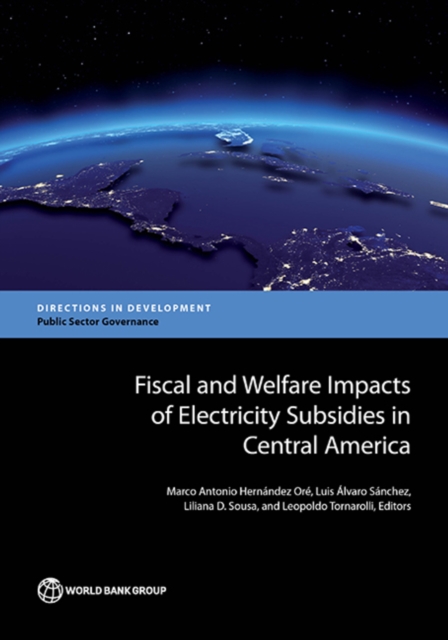
Fiscal and welfare impacts of electricity subsidies in central America : moving from theory to practice in low- and middle-income countries Paperback / softback
by World Bank, Marco Antonio Hernandez Ora
Part of the Directions in development series
Paperback / softback
Description
Central American countries spend approximately one percent of their aggregate gross domestic product subsidizing residential electricity consumption.
This amount is comparable with what these countries spend on education and social assistance.
The pressure that electricity subsidies exert on government budgets is particularly high when international energy prices rise.
Electricity subsidies also provide perverse incentives for the overconsumption of electricity as households do not pay the true cost of their consumption, which in turn reduces incentives to increase energy efficiency.
This book answers key questions regarding residential electricity subsidies in Central America.
In particular: How do the subsidy mechanisms function in each country?
What are their fiscal costs? Are these subsidies good value for the money? How efficient are subsidies in reaching households in need, and what drives this efficiency?
What are the reform options? The main message of this book is that there is considerable scope for improving the efficiency of electricity subsidies in Central America by better targeting them to low-income households.
The book shows that electricity subsidies help reduce the burden of electricity costs on the lowest-income groups.
However, the existing electricity subsidy schemes are very inefficient at targeting resources to low-income households, with the majority of government spending going to higher-income households.
Indeed, most countries in the region have the opportunity to significantly reduce the fiscal costs of electricity subsidies without imposing significant costs on households, particularly poor households.
Given the limited fiscal space in the region and the major needs of the countries in terms of social services and physical infrastructure, this study seeks to provide Central American policymakers with the analytical foundations necessary to assess the costs and benefits of their electricity subsidy mechanisms, and design effective reform strategies that reflect their unique circumstances and policy priorities.
Information
-
Item not Available
- Format:Paperback / softback
- Pages:216 pages, col. figs, tables
- Publisher:World Bank Publications
- Publication Date:01/09/2017
- Category:
- ISBN:9781464811043
Information
-
Item not Available
- Format:Paperback / softback
- Pages:216 pages, col. figs, tables
- Publisher:World Bank Publications
- Publication Date:01/09/2017
- Category:
- ISBN:9781464811043










